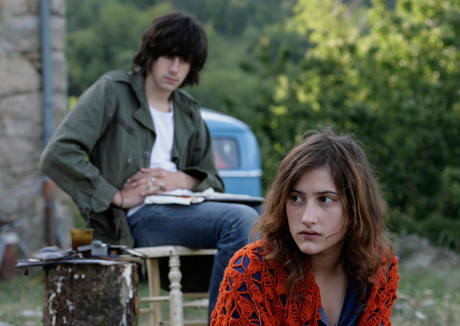In interpreting Olivier Assayas's recent filmography as an auteur vision beyond his usual attention to details, such as clothes, music and attitude of a depicted time or place, it's no surprise that his take on the French student protest movement of the early '70s, Something in the Air, is semi-autobiographical.
With Carlos tackling the titular Marxist political terrorist for Palestinian liberation and films like Boarding Gate, Summer Hours and Demonlover using decidedly different set-ups to bitch about the evils of globalization, this latest preening, almost incidental work of blasé hippie tedium is practically redundant.
If anything, this might be the weakest film in Assayas's lexicon, resting on atypical music and a loose, sun-drenched aesthetic keen on capturing minor details to compensate for his roster of undefined, interchangeable characters.
At the forefront is the shaggy-haired, middle-/upper-class Gilles (Clement Metayer), following the bandwagon of angry, but unfocused teens regurgitating the rage of May 1968 with childish crap like spray painting their school and handing out leaflets to the already converted.
Mostly observant of the broad idealistic twaddle being bantered about at home in France and Italy, where he escapes to with friends after their shenanigans leave a school employee in a coma, he reads the standard pretentious texts (Pascal, Marx, etc.), avoids responsibility and uses free love as an excuse to put his dick wherever he pleases.
At first, it's Laure (Carole Combs) who splinters off on her own path of excess indulgence, and then it's Christine (Lola Creton), who eventually goes the route of political documentary filmmaking and distribution. There's even an extended discussion about how using the existing narrative style of the bourgeois in film isn't helping their radical disposition.
While everything looks and feels like an Assayas film, from style to camerawork to political discourse, the broad superficiality of the many teens running about, painting each other in the nude and smoking pot leaves absolutely nothing to engage in beyond artifice.
Seemingly, the intentions are to mirror the incidental, lemming approach of French teen rage of the time to the modern day ethos, wherein the privileged children of the baby boomer generation protest broad, unfocused platitudes for something to do.
But the hipster vibe of it all makes the inevitable defeat, or self-destruction, of each character in the film seem like martyrdom, which could be read as encouragement to those desperate to assume an identity or purpose.
(Mongrel Media)With Carlos tackling the titular Marxist political terrorist for Palestinian liberation and films like Boarding Gate, Summer Hours and Demonlover using decidedly different set-ups to bitch about the evils of globalization, this latest preening, almost incidental work of blasé hippie tedium is practically redundant.
If anything, this might be the weakest film in Assayas's lexicon, resting on atypical music and a loose, sun-drenched aesthetic keen on capturing minor details to compensate for his roster of undefined, interchangeable characters.
At the forefront is the shaggy-haired, middle-/upper-class Gilles (Clement Metayer), following the bandwagon of angry, but unfocused teens regurgitating the rage of May 1968 with childish crap like spray painting their school and handing out leaflets to the already converted.
Mostly observant of the broad idealistic twaddle being bantered about at home in France and Italy, where he escapes to with friends after their shenanigans leave a school employee in a coma, he reads the standard pretentious texts (Pascal, Marx, etc.), avoids responsibility and uses free love as an excuse to put his dick wherever he pleases.
At first, it's Laure (Carole Combs) who splinters off on her own path of excess indulgence, and then it's Christine (Lola Creton), who eventually goes the route of political documentary filmmaking and distribution. There's even an extended discussion about how using the existing narrative style of the bourgeois in film isn't helping their radical disposition.
While everything looks and feels like an Assayas film, from style to camerawork to political discourse, the broad superficiality of the many teens running about, painting each other in the nude and smoking pot leaves absolutely nothing to engage in beyond artifice.
Seemingly, the intentions are to mirror the incidental, lemming approach of French teen rage of the time to the modern day ethos, wherein the privileged children of the baby boomer generation protest broad, unfocused platitudes for something to do.
But the hipster vibe of it all makes the inevitable defeat, or self-destruction, of each character in the film seem like martyrdom, which could be read as encouragement to those desperate to assume an identity or purpose.
